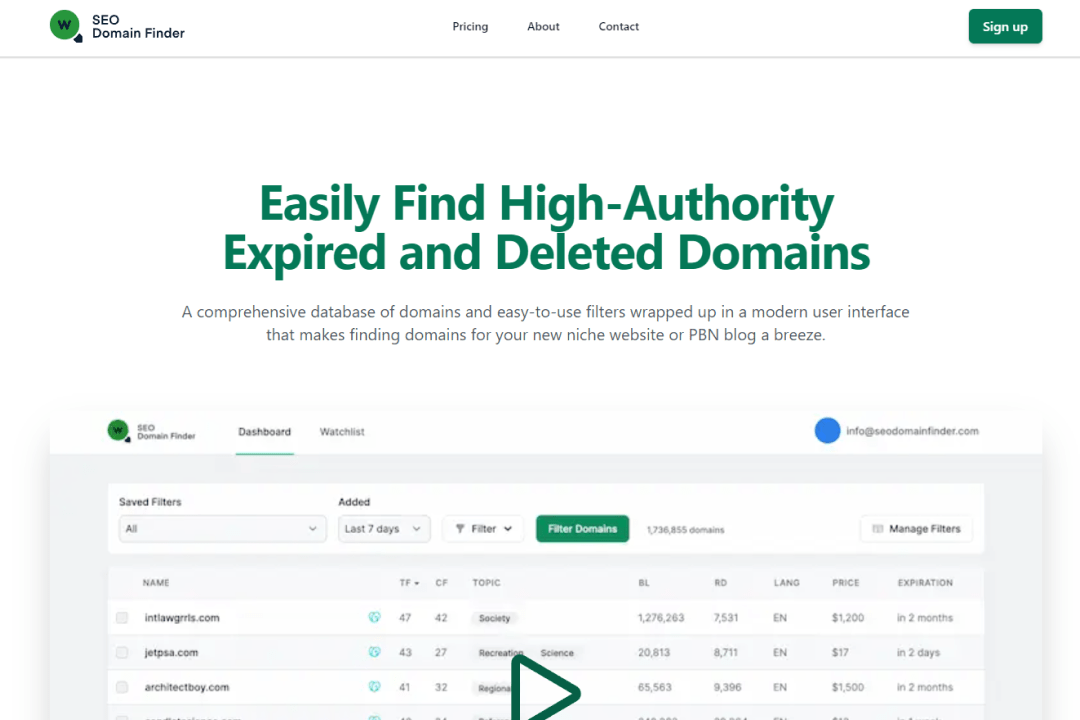
Choosing the right domain name is more than just a branding decision – it’s a critical factor that can influence your website’s visibility and success in search engine rankings. In the highly competitive digital landscape, your domain name serves as a first impression for both users and search engines. From keyword relevance to domain authority, the choices you make when selecting or managing a domain can either boost your SEO strategy or hinder it.
This guide dives into the intricate relationship between domain names and SEO, exploring how aspects like keyword optimization, domain extensions, and brand consistency can affect your site’s performance. Whether you’re starting a new website or rebranding an existing one, understanding the impact of domain names on search engine rankings is essential to staying ahead in the ever-evolving world of SEO. Read on to discover actionable tips and expert insights that will help you make informed decisions and enhance your online presence.
Key Takeaways
- Domain names play an important role in SEO by increasing brand visibility and improving user experience.
- While keywords in domain names can contribute to relevancy, they do not have a direct impact on search engine rankings.
- Short and memorable domain names are more likely to enhance user engagement and aid in better brand recall.
- Including geographic references in domain names can benefit local search engine optimization efforts.
- Maintaining domain credibility and security is crucial for establishing trust and upholding reputation in search engine rankings.
Understanding Domain Names
Domain names are structured in levels, with the top-level domain (TLD), like .com, .org, or .net, appearing at the end. The text before this refers to the second-level domain (SLD)., which is the name you choose for your site. Together, they form the full domain name, like mywebsite.com. These elements play a pivotal role in shaping how your site is perceived by users and search engines alike.
Understanding how domain names function can give you a strategic edge in SEO (Search Engine Optimization). They aren’t just technical necessities – they are branding tools that influence trust, recognition, and search engine performance. A domain name that aligns with your business goals and incorporates relevant keywords can enhance your website’s visibility and attract your target audience more effectively.
Contrary to common belief, Google has stated that domain names don’t have a direct impact on search rankings . This means that merely including keywords in your domain name won’t automatically boost your search engine visibility.
However, the choice of a domain name does influence how users perceive your website. A clear and memorable domain name can enhance your brand’s visibility, improve user experience, and indirectly benefit SEO by increasing site traffic and engagement. Names that are relevant and easy to remember can potentially result in higher click-through rates from search results, ultimately contributing positively to your SEO performance over time.
Although domains themselves don’t directly affect search engine rankings, they play a significant role in establishing your website’s credibility and building trust with users. It’s essential to view your domain name as a fundamental aspect of your online brand identity rather than solely focusing on SEO tactics.
The key is to create a name that resonates with your target audience and fosters a strong connection, rather than attempting to manipulate search algorithms.
SEO Myths About Domain Names
Many misconceptions surround the role of domain names in search engine rankings, leading to misplaced priorities and efforts. By debunking these myths, you can set more realistic expectations and focus on what truly drives SEO success. Instead of adhering to outdated beliefs about domain names, prioritize strategies that make a meaningful impact – such as producing quality content, building authoritative backlinks, and enhancing user experience.
The Myth About Keywords in Domain Names
One of the most common misconceptions is that including keywords in domain names or using exact match domains (EMDs) provides a significant boost to search engine rankings. While this was once a more influential factor, search engines like Google now prioritize content quality, relevance, and user experience over the presence of keywords in domain names. As a result, the direct impact of keywords in domain names on competitive advantage is minimal.
The Myth About Domain Age and Rankings
Another myth is that older domains inherently rank better because of their longevity. While it might seem intuitive to associate domain age with authority, Google has explicitly stated that domain age is not a primary ranking factor. An aged domain without quality content or strong backlinks won’t perform better simply because it’s been around longer.
The Myth About The Role of Domains in Navigational Queries
Domain names do have some relevance in navigational search queries, where users directly enter a domain name into the search bar. However, their influence on broader search engine rankings is minimal. A recognizable and easy-to-remember domain may enhance user trust and direct traffic but doesn’t provide an edge in organic search rankings.
Selecting SEO-Friendly Domains
When selecting a domain name, it’s important to consider factors that can impact SEO, even though the direct influence is limited. Opt for shorter domain names, ideally between 6-14 characters, to improve visibility and memorability.
While including relevant keywords in your domain may not directly boost rankings as before, it can still enhance user experience by clearly indicating the website’s focus.
Adding geographic references to your domain can benefit local search optimization, increasing relevance to local audiences. Avoid special characters and hyphens in your domain as they can complicate it and diminish user experience.
Choose memorable domain names that resonate with your target audience to enhance recognition and credibility online. A simple and relevant domain name is fundamental for branding and shaping users’ perceptions of your website.
You can check out our article How to Choose SEO-Friendly Domain Name to learn more.
Domain Names and Branding
Selecting an appropriate domain name plays a crucial role in shaping customer perceptions of your brand, influencing trust and credibility. A domain that mirrors your brand identity helps establish a strong online presence and fosters positive customer impressions. It’s essential to choose a name that resonates with your target audience and accurately reflects your business’s core values.
A memorable and relevant domain name can give your brand a competitive edge and enhance brand recognition. Beyond improving search engine visibility, it can position your business as a preferred choice within your industry. A secure domain name also plays a key role in managing your brand’s online reputation and preserving organic search rankings.
It is important to align your domain name with the most recognizable aspect of your business to strengthen your market position and connect effectively with your target audience. By strategically selecting your domain name, you can create a solid foundation for your digital marketing strategies, transforming your online presence into a valuable asset for your business.
You can learn more about brand awareness here: https://quirk.biz/what-is-brand-awareness/
Future Trends in SEO
The world of SEO is constantly evolving, with new trends and technologies shaping how businesses optimize their online presence. Staying ahead of these changes is essential to maintain visibility and relevance in search engine results. From voice search optimization to mobile-first indexing, understanding and adapting to these emerging trends will ensure your website remains competitive in the digital landscape.
Voice Search Optimization and AI Integration
As voice-activated devices become more prevalent, optimizing for voice search is critical for maintaining visibility in search engine results. Future-focused domain strategies should account for this trend by ensuring content is conversational, easily understood, and tailored to natural language queries. You can read our article How AI Is Changing the Domain Name for more information.
The Growing Importance of User Experience and Content Quality
Search algorithms increasingly prioritize user experience and content quality. These elements not only boost user engagement but also directly influence rankings. High-quality, relevant content helps reduce bounce rates and improves conversions by keeping visitors engaged longer.
Adapting to SERP Features and Mobile-First Indexing
Search engines now emphasize mobile-first indexing and the integration of SERP (Search Engine Results Page) features like rich snippets and local packs. With mobile usage continuing to rise, it’s essential for websites to perform seamlessly on mobile devices to meet user expectations and maintain rankings.
Local SEO and Geographic Targeting
For businesses focusing on specific regions, local SEO remains a cornerstone strategy. Tailoring your domain and website content to meet the needs of local users can enhance visibility in localized search results and help capture relevant traffic.
Staying Ahead with Evolving SEO Trends
The SEO landscape is constantly changing, requiring businesses to adapt their strategies to stay competitive. By keeping up with the latest trends – such as voice search, mobile-first indexing, and SERP optimization – you can ensure your domain name and overall strategy effectively align with both search engine requirements and user preferences.
Conclusion
Domain names are an essential part of your online presence, but their direct impact on SEO is often misunderstood. While factors like keywords and domain age have minimal influence on search rankings, a well-chosen domain name can still play a significant role in building trust, enhancing brand recognition, and improving user experience.
To succeed in the ever-changing world of SEO, focus on what truly matters: creating high-quality, engaging content, optimizing for user experience, and staying ahead of trends like voice search, mobile-first indexing, and SERP features. By understanding the myths and realities of domain names and aligning your strategies with modern SEO practices, you can ensure your website thrives in search engine rankings and delivers value to your audience.
Whether you’re selecting a new domain or refining your current strategy, making informed decisions today will set the foundation for long-term online success.











































































































